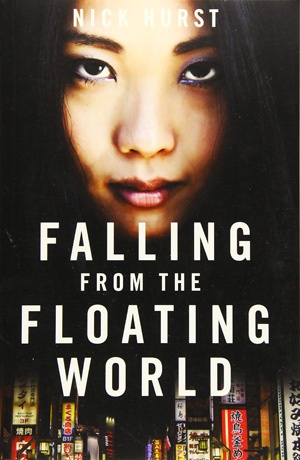
During the Edo period (1615-1868), The Floating World, or ukiyo, described a lifestyle and culture of pleasure-seeking, a world of entertainment and play in Japan’s three main cities – Edo (now Tokyo), Osaka and Kyoto. The centre of ukiyo was in the Yoshiwara district of Edo, also a red-light district.
Ray Clarence finds himself in present day Edo after being fired from his advertising agency job in London. No surprises here – Ray is every stereotyped male under 30 who wants to escape a dead-end job, ex-girlfriend or just life in general to explore the ‘exotic’ East. With a background in Japanese studies and having lived in Japan before, he promptly finds himself a job as a high school teacher and a distraction in the beautiful and mysterious Tomoe. Naive Ray finds her secretiveness intriguing and instead of wearing him out her distant demeanour only fuels his interest.
When Tomoe’s father is apparently murdered by yakuza, she coaxes Ray into helping her take revenge. Tomoe plays the role of the helpless female to perfection and Ray is more than eager to save her from herself and these hardened criminals. She sends him to the bathhouses of Soaplands, where massage and prostitution roll into one another, to speak to Sakura, a girl who works at the Matsubaya bathhouse. Without any questions and a little bit too willingly Ray schedules an appointment…
Shortly after Ray’s visit to Sakura he starts poking around in an attempt to find the murderers of Tomoe’s father and subsequently attracts the wrong kind of attention. Ernesto Aerts, a champion martial artist, shows up at his door with a request from a Japanese organisation to refrain from asking further enquiries into the murder.
When Tomoe vanishes into thin air without any explanation, Ray begins to suspect that Tomoe’s flakiness and general unpredictability might be linked to her career as a ‘cultural curator’. He realises that Tomoe actually belonged to the present day ‘floating world’, a hiding place for unscrupulous politicians, yakuza, sumo wrestlers and prostitutes. This cast of interesting characters from the underworld are the actual stars of the novel, not the two fallible main characters who aimlessly and fatalistically navigate through life.
In Japanese a homophone for ukiyo (floating world) also means ‘sorrowful world’ and in Buddhism it refers to the endless cycle of life, suffering, death and rebirth. Continual struggle, melancholy and despondency are visible in Ray’s approach to life and particularly his emergence into Tokyo’s criminal world.
Whether it’s because he’s unwise or just obtuse, eventually he crosses paths with the infamous Takata-gumi, Tokyo’s largest gang, and is briskly duped into Tokyo’s criminal underworld. He is confronted by Takata Eiji, head of the gang, and roughed up repeatedly until he becomes one of them.
Falling From the Floating World is in essence an ode to Tokyo. Nick Hurst knows the city and Japanese culture intimately. Between chapters he utilises ukiyo-e, or ‘floating world pictures’, which are traditional Japanese woodblock prints as illustrative tools. Small details such as these, as well as notes on Japanese pronunciation and a list of characters, provide invaluable cultural references bringing colour to the otherwise slow story.
Hurst’s detailed descriptions provide pockets of meticulous observation which can only be conveyed realistically through either extensive research or living in the city. These insights transform Tokyo into a fully fledged character in the book and subsequently the murder and Tomoe’s disappearance take a backseat to its looming presence.
The story starts slowly and isn’t driven by a strong plot, but the arrival of a cast of characters who live on the edge of society and much like our two main characters are forever floating in a parallel world where most societal rules don’t apply saves the novel from falling off the edge. Although Falling From the Floating World isn’t Japanese crime fiction per se, it will capture your attention if you are interested in Japanese culture, particularly in its present day form.
Also try Nicolas Obregon‘s police procedurals, or Michael Pronko‘s Tokyo mysteries.
Unbound Books
Print/Kindle
£.8.99
CFL Rating: 3 Stars